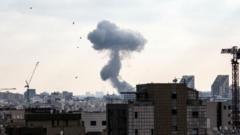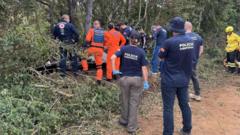Amidst the chaos of airstrikes, Iranians grapple with shock, despair, and the longing for peace as they navigate an uncertain future.
**"Voices of Turmoil: Iranians React to US Airstrikes on Nuclear Facilities"**

**"Voices of Turmoil: Iranians React to US Airstrikes on Nuclear Facilities"**
As tensions rise, Iranians share their fears and hopes in the aftermath of US military action.
In the wake of recent US airstrikes on various Iranian nuclear facilities, the emotional turmoil within Iran is palpable. Iranians have reached out to news agencies to express their deep fears and anger, illustrating the stark reality of their experiences following a wave of military aggression. One individual, using the pseudonym Shahla for safety, described her paralysis in the face of relentless uncertainty: "My days and nights are the same. I feel paralyzed. I just stare at the ceiling all day and all night." The strikes, ordered by US President Donald Trump, targeted the Isfahan, Natanz, and Fordo facilities, with the President asserting that they have been "obliterated."
The Iranian response has been swift, with Foreign Minister Abbas Araghchi acknowledging that the US had crossed "a big red line," signaling dire consequences ahead. This military escalation came shortly after Israel escalated its air campaign against Iran, claiming it was addressing threats posed by its nuclear and missile programs. Casualty figures vary, with Iran’s health ministry reporting at least 430 dead while other human rights groups suggest the true toll is higher.
As communications have become limited due to government-imposed internet restrictions, voices like Mehri, who expressed personal anguish over the strikes, have emerged. She voiced feelings of profound sorrow and rage, while simultaneously finding clarity in the situation, saying, "This war - Iran's war - is essentially a conflict between three individuals." This reflects a growing perception among many that geopolitical conflicts are defined not only by nations but also by the ideologies of individual leaders.
Some Iranians, like Homayoun from Maku, display fierce defiance against US threats; their loyalty to their country fuels a commitment to resist foreign intervention. "We won't let America and its lackeys make any wrong moves in our country," he states, emphasizing a readiness to defend their homeland. Meanwhile, Araghchi reiterated Iran's preparedness to defend its sovereignty, stating that the US would bear full responsibility for the repercussions of its actions.
As hardliners demand aggressive responses, calls have emerged advocating for targeted actions against US assets in the Gulf, underlining the brewing tensions in the region. Yet, amidst the upheaval, some citizens are hopeful for a resolution. One individual expressed a desire for his soon-to-be-born child to herald in a new era for Iran, suggesting a yearning for reform that comes from within rather than from external forces.
Others critique the historical cost of Iran's nuclear aspirations, reflecting a nuanced discontent with the Islamic Republic's past actions while still opposing foreign manipulation of their nation's future. A young woman who fled to Armenia voiced her concerns regarding foreign-led regime change, expressing hope for domestic reforms instead.
As the situation develops, the voices of ordinary Iranians reveal the complex interplay between grief, anticipation, and resilience in the face of an uncertain future.
The Iranian response has been swift, with Foreign Minister Abbas Araghchi acknowledging that the US had crossed "a big red line," signaling dire consequences ahead. This military escalation came shortly after Israel escalated its air campaign against Iran, claiming it was addressing threats posed by its nuclear and missile programs. Casualty figures vary, with Iran’s health ministry reporting at least 430 dead while other human rights groups suggest the true toll is higher.
As communications have become limited due to government-imposed internet restrictions, voices like Mehri, who expressed personal anguish over the strikes, have emerged. She voiced feelings of profound sorrow and rage, while simultaneously finding clarity in the situation, saying, "This war - Iran's war - is essentially a conflict between three individuals." This reflects a growing perception among many that geopolitical conflicts are defined not only by nations but also by the ideologies of individual leaders.
Some Iranians, like Homayoun from Maku, display fierce defiance against US threats; their loyalty to their country fuels a commitment to resist foreign intervention. "We won't let America and its lackeys make any wrong moves in our country," he states, emphasizing a readiness to defend their homeland. Meanwhile, Araghchi reiterated Iran's preparedness to defend its sovereignty, stating that the US would bear full responsibility for the repercussions of its actions.
As hardliners demand aggressive responses, calls have emerged advocating for targeted actions against US assets in the Gulf, underlining the brewing tensions in the region. Yet, amidst the upheaval, some citizens are hopeful for a resolution. One individual expressed a desire for his soon-to-be-born child to herald in a new era for Iran, suggesting a yearning for reform that comes from within rather than from external forces.
Others critique the historical cost of Iran's nuclear aspirations, reflecting a nuanced discontent with the Islamic Republic's past actions while still opposing foreign manipulation of their nation's future. A young woman who fled to Armenia voiced her concerns regarding foreign-led regime change, expressing hope for domestic reforms instead.
As the situation develops, the voices of ordinary Iranians reveal the complex interplay between grief, anticipation, and resilience in the face of an uncertain future.























